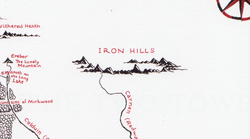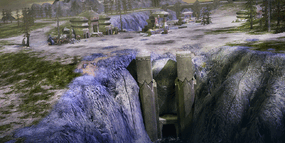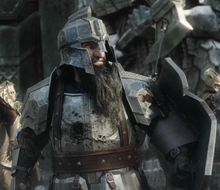Tag: Visual edit |
HiddenVale (talk | contribs) No edit summary Tag: Visual edit |
||
| Line 26: | Line 26: | ||
=== Inhabitants === |
=== Inhabitants === |
||
| ⚫ | The Dwarves who first settled in the Iron Hills during the First Age were of the clan of the [[Durin's folk|Longbeards]], most commonly known as Durin's Folk, and consequently were of the most noble kind of Dwarves. The Hills were mined uninterruptedly for thousands of years by them, because of the hills' rich amount of iron. The [[Old Forest Road|Old Dwarf Road]] that crossed [[Mirkwood]] was, in fact, built by the Longbeards to connect their mansions in the [[Misty Mountains]] (namely, [[Khazad-dûm]] and [[Gundabad]]) with the Iron Hills. |
||
| − | |||
| ⚫ | |||
The exiles who settled in the Iron Hills were of course in friendly relations with the Dwarves of the [[Lonely Mountain]] (Erebor), who were of similar like and mind, being kin to Grór and [[Thrór]]. |
The exiles who settled in the Iron Hills were of course in friendly relations with the Dwarves of the [[Lonely Mountain]] (Erebor), who were of similar like and mind, being kin to Grór and [[Thrór]]. |
||
| − | + | There was at least one settlement in the Iron Hills, the seat of Grór and his descendants, but there is no indication of its name or precise location. |
|
| + | |||
| ⚫ | |||
== History == |
== History == |
||
| ⚫ | The Iron Hills were probably settled by the Dwarves of Durin's Folk for many years, with the [[Old Forest Road]] being used as a trade route and as a means for the Dwarves of the east and west to communicate. The realm of the Iron Hills was formally founded by [[Grór]], younger son of [[Dáin I]], in [[TA 2590]] after the Dwarves were driven out of the [[Grey Mountains]], because of the continuing attacks by the [[Cold-drakes]], culminating in the death of Dáin I. |
||
| ⚫ | |||
| − | |||
| ⚫ | The Iron Hills were probably settled by the Dwarves of Durin's Folk for many years, with the [[Old Forest Road]] being used as a trade route and as a means for the Dwarves of the east and west to communicate |
||
In [[TA 2941]], the Dwarf lord [[Dáin II Ironfoot]] of the Iron Hills led an army of five hundred warriors to the defense of [[Thorin Oakenshield]] which then joined in the [[Battle of Five Armies]] and fought valiantly there. After Thorin's death after the battle, the vacant throne of the Lonely Mountain passed to Thorin's cousin and friend Dain who then became its King and the Iron Hills passed out of records afterwards but they may not have been deserted, and it was possible that Dain and his [[Thorin III Stonehelm|son]] retained dominion over them.<ref>''[[The Hobbit]],'' Chapter XV: "[[The Gathering Of The Clouds|The Gathering of the Clouds]]"</ref><ref>''[[The Hobbit]],'' Chapter XVII: "[[The Clouds Burst]]"</ref> |
In [[TA 2941]], the Dwarf lord [[Dáin II Ironfoot]] of the Iron Hills led an army of five hundred warriors to the defense of [[Thorin Oakenshield]] which then joined in the [[Battle of Five Armies]] and fought valiantly there. After Thorin's death after the battle, the vacant throne of the Lonely Mountain passed to Thorin's cousin and friend Dain who then became its King and the Iron Hills passed out of records afterwards but they may not have been deserted, and it was possible that Dain and his [[Thorin III Stonehelm|son]] retained dominion over them.<ref>''[[The Hobbit]],'' Chapter XV: "[[The Gathering Of The Clouds|The Gathering of the Clouds]]"</ref><ref>''[[The Hobbit]],'' Chapter XVII: "[[The Clouds Burst]]"</ref> |
||
| Line 47: | Line 46: | ||
*As he was mentioned above, Grór was the son of the mighty [[Dwarf]], Dáin I and was also the founder and first ruler of the Iron Hills. |
*As he was mentioned above, Grór was the son of the mighty [[Dwarf]], Dáin I and was also the founder and first ruler of the Iron Hills. |
||
| + | [[File:Wor_iron_hills_loadscreen.gif|thumb|285x285px|A dwarf-settlement of the Iron Hills as seen in [[The Battle for Middle-earth II|''The Battle for Middle-earth II'']]]][[Náin]] |
||
| − | [[Náin]] |
||
*Náin was the son of Grór who was the founder of the Iron Hills. Náin was killed during the [[Battle of Azanulbizar]] by the [[Orc]] lord [[Azog]] of [[Moria]]. |
*Náin was the son of Grór who was the founder of the Iron Hills. Náin was killed during the [[Battle of Azanulbizar]] by the [[Orc]] lord [[Azog]] of [[Moria]]. |
||
| + | [[File:Iron Hills Soldier.png|thumb|220x220px|A Dwarf warrior from the Iron Hills]][[Dáin II]] |
||
| − | [[Dáin II]] |
||
*Dáin II was son of Náin and became the lord of the Iron Hills after the death of his great father. He was considered a mighty Dwarf because he killed the Orc Azog when he was at an age which was considered young to the Dwarves. He became the [[King under the Mountain]] after the slaying of [[Smaug]] and loss of [[Thorin II Oakenshield]] in the [[Battle of the Five Armies]] until his death during the [[War of the Ring]]. |
*Dáin II was son of Náin and became the lord of the Iron Hills after the death of his great father. He was considered a mighty Dwarf because he killed the Orc Azog when he was at an age which was considered young to the Dwarves. He became the [[King under the Mountain]] after the slaying of [[Smaug]] and loss of [[Thorin II Oakenshield]] in the [[Battle of the Five Armies]] until his death during the [[War of the Ring]]. |
||
Revision as of 14:45, 10 May 2021
The Iron Hills were a range of mountains located in the north of Middle-earth, and was a realm of the Dwarves of Durin's Folk.
Description
Location
The Iron Hills were located in the northern and eastern parts of Middle-earth. The mountain range is in between Rhovanion and Rhûn. The hills are east of the Lonely Mountain.
The Land
The Iron Hills were rich in minerals, most notably iron – whence came the name of the Hills. The Hills were originally a part of the massive Iron Mountains where Morgoth dwelt; other remains of this vanished range were the Mountains of Angmar and Ered Mithrin. The Iron Hills were also the source of the River Redwater, the reddish colour of which came from iron particles in its water. The river joins onto the River Running.
Inhabitants
The Dwarves who first settled in the Iron Hills during the First Age were of the clan of the Longbeards, most commonly known as Durin's Folk, and consequently were of the most noble kind of Dwarves. The Hills were mined uninterruptedly for thousands of years by them, because of the hills' rich amount of iron. The Old Dwarf Road that crossed Mirkwood was, in fact, built by the Longbeards to connect their mansions in the Misty Mountains (namely, Khazad-dûm and Gundabad) with the Iron Hills.
The exiles who settled in the Iron Hills were of course in friendly relations with the Dwarves of the Lonely Mountain (Erebor), who were of similar like and mind, being kin to Grór and Thrór.
There was at least one settlement in the Iron Hills, the seat of Grór and his descendants, but there is no indication of its name or precise location.

The hills' location on a map of Middle-earth
History
The Iron Hills were probably settled by the Dwarves of Durin's Folk for many years, with the Old Forest Road being used as a trade route and as a means for the Dwarves of the east and west to communicate. The realm of the Iron Hills was formally founded by Grór, younger son of Dáin I, in TA 2590 after the Dwarves were driven out of the Grey Mountains, because of the continuing attacks by the Cold-drakes, culminating in the death of Dáin I.
In TA 2941, the Dwarf lord Dáin II Ironfoot of the Iron Hills led an army of five hundred warriors to the defense of Thorin Oakenshield which then joined in the Battle of Five Armies and fought valiantly there. After Thorin's death after the battle, the vacant throne of the Lonely Mountain passed to Thorin's cousin and friend Dain who then became its King and the Iron Hills passed out of records afterwards but they may not have been deserted, and it was possible that Dain and his son retained dominion over them.[1][2]
Notable Dwarves of the Iron Hills
- As he was mentioned above, Grór was the son of the mighty Dwarf, Dáin I and was also the founder and first ruler of the Iron Hills.

A dwarf-settlement of the Iron Hills as seen in The Battle for Middle-earth II
- Náin was the son of Grór who was the founder of the Iron Hills. Náin was killed during the Battle of Azanulbizar by the Orc lord Azog of Moria.

A Dwarf warrior from the Iron Hills
- Dáin II was son of Náin and became the lord of the Iron Hills after the death of his great father. He was considered a mighty Dwarf because he killed the Orc Azog when he was at an age which was considered young to the Dwarves. He became the King under the Mountain after the slaying of Smaug and loss of Thorin II Oakenshield in the Battle of the Five Armies until his death during the War of the Ring.
- Thorin III was the son of Dáin II, after his father's death and soon became the Lord of both the people of the Lonely Mountain and possibly the Iron Hills. He was praised for helping to reconstruct the Lonely Mountain and Dale. During his rule a new Dwarven settlement was founded at Helm's Deep.
See also
Translations
| Foreign Language | Translated name |
| Afrikaans | Yster Heuwels |
| Albanian | Kodrat Hekuri |
| Amharic | ብረት ኮረብታዎች |
| Arabic | تلال الحديد |
| Armenian | Երկաթե բլուրներ |
| Azerbaijani | Dəmir təpələr |
| Basque | Burdina Muinoak |
| Belarusian Cyrillic | Жалезныя Пагоркі |
| Bengali | আয়রন পাহাড় |
| Bosnian | Željezna Brda |
| Bulgarian Cyrillic | Железните Хълмове |
| Cambodian | ភ្នំដែក |
| Catalan | Turons de ferro |
| Cebuano | Puthaw nga mga Bungtod |
| Chinese (Hong Kong) | 鐵丘陵 |
| Cornish | Breow Horn |
| Corsican | Culline di Ferro |
| Croatian | Željezna brda |
| Czech | Železné Kopce |
| Danish | Jernhøjene / Jernbjergene |
| Dutch | IJzerheuvels |
| Esperanto | Fero Montetoj |
| Estonian | Raudmäed |
| Filipino | Bakal Burol |
| Finnish | Rautamäkiä |
| French | Collines de Fer |
| Frisian | Izeren Heuvels |
| Galician | Montes de Ferro |
| Georgian | რკინის ბორცვი |
| German | Eisenberge |
| Greek | Σιδερένιοι Λόφοι |
| Hebrew | גבעות הברזל |
| Hindi | लौह पहाड़ियों |
| Hmong | Hlau Toj |
| Hungarian | Vasdombok |
| Icelandic | Járnhæðir |
| Igbo | Ígwè ugwu nta |
| Indonesian | Bukit Besi |
| Irish Gaelic | Cnoic Iarann |
| Italian | Colline del Ferro |
| Japanese | くろがね連山 |
| Javanese | Bukit Wesi |
| Kannada | ಕಬ್ಬಿಣದ ಬೆಟ್ಟಗಳ |
| Kazakh | Темір төбеден (Cyrillic) Temir töbeden (Latin) |
| Korean | 철산 |
| Kurdish | Çiyan Hesin (Kurmanji) |
| Kyrgyz Cyrillic | темир адырлар |
| Latin | ferrum Collibus |
| Laotian | ໃນເຂດເນີນພູທາດເຫຼັກ |
| Latvian | Dzelzs Pauguri |
| Lithuanian | Geležies Kalvos |
| Luxembourgish | Eisen Hiwwele |
| Macedonian Cyrillic | Ирон Хиллс |
| Malagasy | Vy Havoana |
| Malaysian | Bukit Besi |
| Maltese | Għoljiet tal-ħadid |
| Maori | Maunga Rino |
| Marathi | लोह टेकड्या |
| Mongolian Cyrillic | Төмөр толгод |
| Norwegian | Jernhøene |
| Occitan | Fèrre Montanha |
| Pashto | ناوتو كوي غونډيو |
| Persian | آهن هیلز |
| Polish | Żelazne Wzgórza |
| Portuguese | Colinas de Ferro (Brazil)
Montes de Ferro (Portugal) |
| Punjabi | ਲੋਹੇ ਦੀਆਂ ਪਹਾੜੀਆਂ |
| Romanian | Dealurile de Fier |
| Romansh | Crest Fier |
| Russian | Железные Холмы |
| Samoan | Uʻamea Mauga |
| Scottish Gaelic | Iarann Cnuic |
| Serbian | Гвоздена брда (Cyrillic) Gvozdena brda (Latin) |
| Sesotho | Tšepe maralla a |
| Sindhi | لوهه ٽڪرين |
| Sinhalese | යකඩ කඳු |
| Slovak | Železné vrchy |
| Slovenian | Železno hribovje |
| Spanish (Spain and Latin America) | Colinas de Hierro |
| Swedish | Järnbergen |
| Tajik Cyrillic | теппаҳо дарзмол |
| Tamil | அயர்ன் ஹில்ஸ் |
| Tatar | Тимер калкулыклар |
| Telugu | ఇనుము కొండలు |
| Thai | ภูเขาเหล็ก |
| Turkish | Demir Tepeler |
| Turkmen | Demir depeler |
| Ukrainian Cyrillic | Ірон Гіллс |
| Urdu | آئرن پہاڑیوں |
| Uzbek | Темир Тепаликлар (Cyrillic) Temir Tepaliklar (Latin) |
| Vietnamese | đồi sắt |
| Welsh | Bryniau Haearn |
| Xhosa | Iinduli Intsimbi |
| Yiddish | פּרעסן היללס |
| Yucatec Maya | Colinas Hierro |
| Zulu | Izintaba zensimbi ? |
| Mountain Ranges of Arda |
|---|
|
Ash Mountains | Blue Mountains | Echoriad | Ephel Dúath | Ered Gorgoroth | Ered Lómin | Ered Wethrin | Grey Mountains (north) | Grey Mountains (south) | Iron Hills | Iron Mountains | Misty Mountains | Mountains of Angmar | Mountains of Mirkwood | Mountains of Mithrim | Mountains of the Wind | Orocarni | Pelóri | Walls of the Sun | White Mountains | Yellow Mountains |
| Dwarven realms of Middle-earth throughout the Ages | |
|---|---|
| Years of the Trees and First Age: | Amon Rûdh | Belegost | Khazad-dûm | Mount Gundabad | Nogrod | Narukuthûn | Blue Mountains |
| Second Age: | Khazad-dûm | Belegost | Nogrod | Mount Gundabad | Blue Mountains | Iron Hills |
| Third Age: | Grey Mountains | Iron Hills | Khazad-dûm | Lonely Mountain | Blue Mountains | Dunland |
| Fourth Age: | Glittering Caves | Khazad-dûm | Lonely Mountain | Blue Mountains | Iron Hills |
References
- ↑ The Hobbit, Chapter XV: "The Gathering of the Clouds"
- ↑ The Hobbit, Chapter XVII: "The Clouds Burst"
